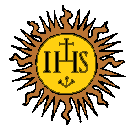|
|
| St. Nicholas Owen |  |

Coadjutor Brother who was a mason and carpenter by trade, and who wonderfully
used these
talents creatively in the service of the persecuted Church in England.
His ingenuity saved
hundreds of priests from capture by the persistent bounty hunters operating
during the
Elizabethan inquisition. Nicholas' cleverness provided priests with
safe refuge from these
priest-hunters.
Of his three brothers, two became priests and one became a printer of underground Catholic books and printed material for the Jesuits. Nicholas' early Jesuit companion was Edmund Campion and Nicholas was arrested when he spoke openly of Campion's innocence.
Nicholas later was released; he then contacted Henry Garnet and became
his associate. In time
the priest hunters got to know Nicholas as "Garnet's man", while the
priests knew him as "Little John".
Nicholas constructed hiding places in the various mansions used as priest-centers
throughout
England. During the day he worked on either the interior or the exterior
of the building, but
always in public view so that the servants would think that he was
a hired carpenter. During the
evening and night, however, he worked on his concealed rooms, digging
deep into the earth or
chipping through thick stone walls. He always worked alone to insure
secrecy. Only he and the
owner of the house knew where the secret rooms were located.
Nicholas had no formal novitiate, but he received his religious training in his close collaboration with his superior.
In 1594, he was helping John Gerard in a London residence when both
were arrested and taken to the Counter prison. Nicholas was still unknown
as the mastermind behind the hiding places
and was considered but a small fish in the vast ocean of Catholic disobedience.
He was released and immediately returned to his inventive labours. Eventually
Nicholas was again captured and brought to the Tower for intense torture
so that the priest hunters could learn the location of his many hiding
places. His silence infuriated his tormentors who increased his unspeakable
suffering until it caused his death. The Elizabethan inquisitors learned
nothing from him. John Gerard said of Nicholas that none other among the
Jesuits had rendered such valuable service to the Catholic cause in England,
"since, through his skill and ingenuity in devising
places of concealment, he had saved the lives of hundreds of people."
Died in the Tower of London, 1606;
Beatified in 1929;
Canonized by Pope Paul VI in 1970 as one of the Forty
Martyrs of England and Wales.